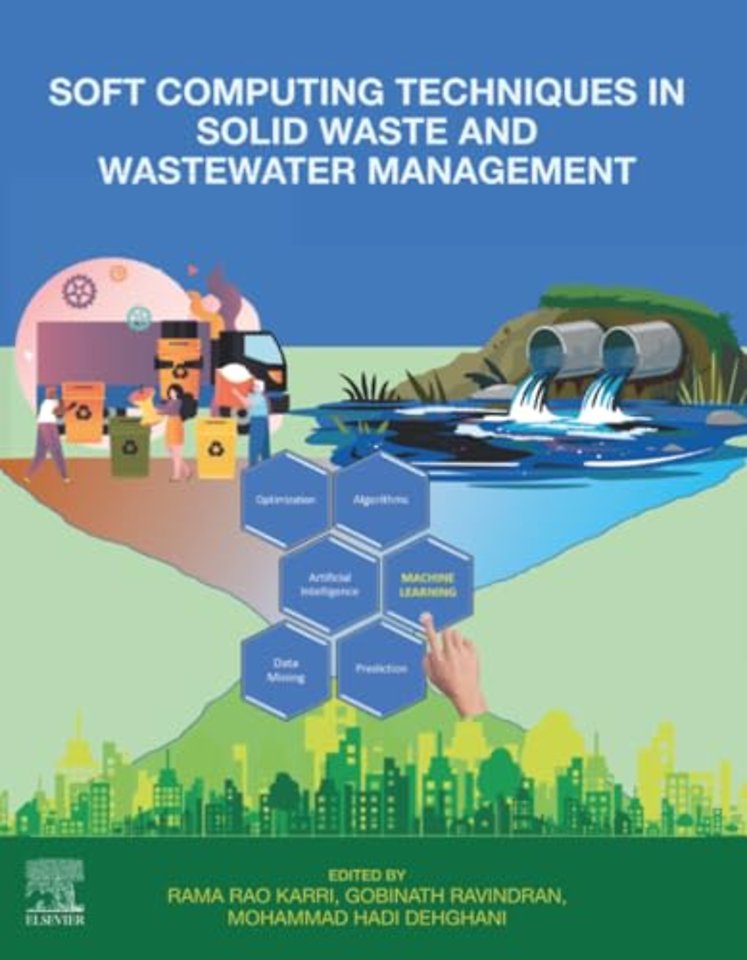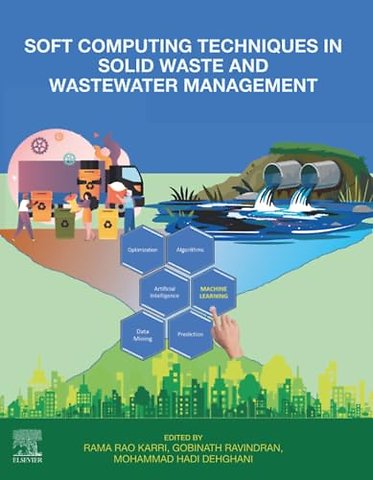<p>Section 1 Soft computing applications in wastewater management</p> <p>1 Wastewater—Sources, Toxicity, and Their Consequences to Human Health<br>Rama Rao Karri, Gobinath Ravindran and Mohammad Hadi Dehghani<br>2 Wastewater Treatment Processes—Techniques, Technologies, Challenges Faced, and Alternative Solutions<br>Bahram Rezai and Ebrahim Allahkarami<br>3 Review of Soft Computing Techniques for Modeling, Design, and Prediction of Wastewater Removal Performance<br>Priya Banerjee, Rama Rao Karri, Aniruddha Mukhopadhyay and Papita Das<br>4 Application of Neural Networks in Wastewater Degradation Process for the Prediction of Removal Efficiency of Pollutants<br>Bahram Rezai and Ebrahim Allahkarami<br>5 Application of Artificial Neural Networks on Water and Wastewater Prediction: A Review<br>Ha Manh Bui, Hiep Nghia Bui, Tuan Minh Le and Rama Rao Karri<br>6 Application of Bayesian Networks Modeling in Wastewater Management<br>Abbas Roozbahani<br>7 Pareto Multiobjective Bioinspired Optimization of Neuro-Fuzzy Technique for Predicting Sediment Transport in Sewer Pipe<br>Isa Ebtehaj, Hossein Bonakdari, Hamed Azimi, Bahram Gharabghi, Seyed Hamed Ashraf Talesh, Ali Jamali and Rama Rao Karri<br>8 Soft Computing Optimization Algorithms and Their Application in Parameter Estimation of a Rigorous Adsorption Kinetics Model<br>Kannan Aravamudan<br>9 Sustainable Management of Wastewater Treatment Plants Using Artificial Intelligence Techniques<br>Mahmoud Nasr, Karam Mohamed, Michael Attia and Mona G. Ibrahim<br>10 Modeling Wastewater Treatment Process: A Genetic Programming Approach<br>C Sivapragasam, Naresh K Sharma and S Vanitha</p> <p>Section 2 Soft computing applications in solid waste management</p> <p>11 Solid Waste—Sources, Toxicity, and Their Consequences to Human Health<br>Mohammad Hadi Dehghani, Ghasem Ali Omrani and Rama Rao Karri<br>12 Solid Waste Treatment: Technological Advancements and Challenges<br>Vinay Pratap, Sakina Bombaywala, Ashootosh Mandpe and Saif Ullah Khan<br>13 Solid Waste Treatment Processes and Remedial Solution in the Developing Countries<br>O.O. Ayeleru and P.A. Olubambi<br>14 Soft Computing Applications in Municipal Solid Waste Forecast: A Short Review<br>O.O. Ayeleru, L.I. Fajimi, B.O. Oboirien and P.A. Olubambi<br>15 Dynamic Multi-objective Optimization of Integrated Waste Management Using Genetic Algorithms<br>Mohamed Abdallah, Zakiya Rahmat-Ullah and Abdulrahman Metawa<br>16 Prediction of Effluent Chemical Oxygen Demand and Suspended Solids From a Domestic Wastewater Treatment Plant Using SVM and ANN<br>Sakaa Bachir, Boudibi Samir, Chaffai Hicham and Hani Azzedine<br>17 Artificial Intelligence Models for Forecasting of Municipal Solid Waste Generation<br>Rahul Mishra, Ekta Singh, Aman Kumar and Sunil Kumar<br>18 A Design Framework for an Integrated End-of-Life Vehicle Waste Management System in Malaysia<br>Norazli Othman, Atikah Razali, Shreeshivadasan Chelliapan, Roslina Mohammad and Hesam Kamyab<br>19 Effect of Normalization Protocol on Pulping Process Selection Using TOPSIS Multicriteria Decision-Making Method—A Case Study of Palm Oil Empty Fruit Bunches<br>Kumar Anupam, Pankaj Kumar Goley and Anil Yadav<br>20 Long-Term Solid Waste Quantity Prediction Using AI-Based Models, Considering Climate Change Impact—A Case Study<br>Aida H. Baghanam, Vahid Nourani and Koorosh Shakoori</p> <p>Section 3 Application of soft computing techniques for process modeling, optimisation and control of waste water and solid waste</p> <p>21 Process Optimization and Modeling of Hydraulic Fracturing Process Wastewater Treatment Using Aerobic Mixed Microbial Reactor via Response Surface Methodology<br>Thirugnanasambandham Karchiyappan and Rama Rao Karri<br>22 Modeling Undefined Complexities of Wastewater Treatment Processes With Artificial Neural Network<br>M. Mansoor Ahammed and Mahesh Gadekar<br>23 Optimization of Process Conditions in Wastewater Degradation Process<br>Saeed Shojaei and Siroos Shojaei<br>24 System Control and Optimization in Wastewater Treatment: A Particle Swarm Optimization (PSO) Approach<br>Xudong Ye, Bing Chen, Rune Storesund and Baiyu Zhang<br>25 Fuzzy Logic Control of Active Sludge–Based Wastewater Treatment Plants<br>Abdul Gaffar Sheik, S. Murali Mohan and A. Seshagiri Rao<br>26 Development of Smart AnAmmOx System and Its Agile Operation and Decision Support for Pilot-Scale WWTP<br>Alam Nawaz, Amarpreet Singh Arora, Choa Mun Yun, Jung June Lee and Moonyong Lee<br>27 Prediction of Ammonium Removal by Biochar Produced From Agricultural Wastes Using Artificial Neural Networks: Prospects and Bottlenecks<br>Ngoc-Thuy Vu and Khac-Uan Do<br>28 Multiscenario Approach for Capturing Uncertainties in Energy-Integrated Autothermal Thermophilic Aerobic Digestion Systems<br>Elisaveta Kirilova, Rayka Vladova, and Natasha Vaklieva-Bancheva</p>

